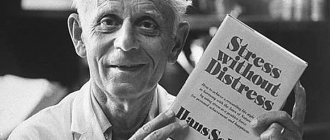Navigation for the article “Obsessive personality type and compulsive personality type: think and grow rich – repeat N times”:
- Obsessive personality type and compulsive personality type: inner world and formation
- Obsessive personality type and compulsive personality type: relationships with others
People with obsessive and compulsive personality types rely on thinking and action, think logically, and respect discipline, accuracy, and the ability to solve practical problems.
Thinking and action are encouraged in Western culture, as opposed to feeling, sensing, intuition or daydreaming. “Think and grow rich” or “salvation through work” is an understandable call for an obsessive and compulsive personality type who controls life through thinking and actions.
This type of personality wants to think correctly or “reflect”, as they say in mass psychology, and act correctly in order to control chance.
Normally, these are rational, practical people who rely on reason. In pathology, patients suffering from intrusive, unwanted thoughts or actions that cannot be controlled: constant hand washing, checking light switches, or exhausting repetitive thoughts.
Obsessive personality type and compulsive personality type: inner world and formation
Parents early teach a child of the obsessive and compulsive type to be responsible - to go to the potty, keep clothes clean, control emotions.
The mother feeds on a schedule, puts her to bed at the same time, establishes laws in the bathroom, prohibits masturbation and noise, and punishes for talking that is not relevant. The child develops high expectations for himself, perfectionism and strict moral standards.
Parents of an obsessive-compulsive child convey a key family message - “spend time well.” “You can’t waste time,” “there’s time for business,” “get busy, there’s no need to suffer through nonsense”—these and other parental phrases are recalled by people with an obsessive-compulsive personality type. As a result, a person does not learn to “knuckle down”, does not know how to rest without a plan, and in general to rest, because he feels guilty if he allows himself to spend time uselessly.
It was customary in the family to finish the food on the plate; I was forced to finish it against my will. “You can’t leave food when people in the world are starving,” my mother said. Until now, I eat food off my plate completely, I can’t throw away old bread, I make crackers out of it.
From a therapeutic conversation
Older children in the family may have an obsessive-compulsive character. Parents are busy with work and life, setting standards of behavior and expecting them to be observed at an early age for the child. The older child must study well, behave correctly with neighbors and relatives, and help. Parents reward correct behavior and punish incorrect behavior.
If the parents are loving, then the child grows up with an obsessive-compulsive personality type, expects a lot from himself, has a list of life goals, and an experience of childhood achievements.
If parents are unreasonably demanding and scrupulous, punishing not only for misconduct, but reproaching them for the desires and thoughts accompanying the misconduct, then the child’s character becomes more pronounced towards pathology.
What will people think if you are fat? No one will want to be your friend if you behave like this! You are already big and could clean the house better! — a client with compulsive psychopathology – bulimia nervosa – recalls her mother’s moralizing messages.
The opposite type of family structure is also associated with obsessive and compulsive personality types. This is the upbringing in a family of incompetent slob parents, in contrast to the control and moralism of caring parents.
Then the child decides not to be like his parents - to become organized, educated, competent, and to keep everything under control. Such standards were not practiced in the family, so they become rigid and are observed without a sense of proportion.
I decided that I would never, ever become like my parents. I achieved everything myself - transferred to another school, entered a university, worked at night. But sexual temptation is extremely difficult to resist, and I hate myself for it.
From a therapeutic conversation
The obsessive personality type is prone to thinking and does not feel the urge to implement their ideas. The compulsive personality type tends to act and rush into action before thinking about what is happening.
In situations of choice, the obsessive personality type is very worried about the loss of options as a result of choice. Endless doubts overcome the obsessive personality type, the decision is postponed until the “ideal” one comes. People of this type make lists of pros and cons, use decision-making techniques, and sort out possible options, wanting to avoid losing alternatives.
Procrastination sometimes continues until the deadline, when circumstances dictate the choice.
A compulsive personality in a situation of choice feels an urge to act. The common reason in both cases - procrastination or hasty choices - is the fear of error and the feeling of guilt if you make even the slightest mistake.
Thus, the fear of making the wrong decision leads to either endless deliberation or hasty, thoughtless actions.
Obsessive personality types and compulsive personality types fear their own negative feelings or personality traits and internally criticize themselves for them. Moreover, the subject of criticism depends on the messages of the families in which the compulsive or obsessive person grew up - sexuality, greed, laziness or envy.
The obsessive-compulsive personality is organized around the idea of control and moral purity. Correct behavior is equated to keeping the bad parts of oneself in check - aggression, anger, laziness, envy, lust, greed, cowardice.
One priest said that the devil does not hear a person’s thoughts, only God hears. I realized that I shouldn’t reproach myself for bad thoughts, because what matters is not what I think, but how I act. I used to scold myself even for unworthy thoughts!
From a therapeutic conversation
Some obsessive people take pride in the severity of their own demands on themselves.
Because obsessive-compulsive people value self-control, order, reliability, and loyalty and have difficulty releasing control, abilities in areas associated with spontaneity—sexuality, play, and humor—are reduced.
Mental (obsessive) attraction is expressed in constant thoughts about the drug, depression, dissatisfaction in the absence of the drug, elation in anticipation of taking the drug. An obsessive drive determines the emotional background, but is not capable (unlike a physical, compulsive drive) to completely occupy the entire content of consciousness and dictate behavior. At the stage of the disease, when an obsessive drive is formed, there is still a struggle of motives. Obsessive drive is aggravated in conflict situations, unpleasant experiences that are not causally related to drug addiction, when visiting places, meeting people, reading literature, and conversations related to drug addiction. Attraction may weaken in conflict situations that are causally related to drug addiction, the emergence of a strong passion, or a state of positive emotional saturation. Obsessive cravings are nonspecific, that is, they can be completely satisfied by another drug, which is the second main difference between obsessive cravings and compulsive cravings.
Obsessive desire is at the same time the most long-lasting and difficult to eliminate symptom of the disease. With the development of the disease and the appearance of more pronounced signs of drug addiction, such as compulsive cravings, withdrawal symptoms, obsessive cravings recede into the background. However, in a state of remission after the removal of acute symptoms and relative physical well-being, the obsessive desire continues to exist to the same degree of severity as before treatment. In the vast majority of cases, mental attraction to drugs is the main and only cause of constant relapses of the disease.
The ability to achieve a state of mental comfort during intoxication is not synonymous with euphoria; it means not so much the experience of pleasure as an escape from a state of displeasure. If a healthy person is able to feel pleasure in many situations, including in a state of drug intoxication, then an addict can only feel pleasure when using a drug. At the same time, if the mental functions of a healthy person in a state of drug intoxication are impaired, then the mental functions of the drug addict, being low outside of intoxication, improve after taking the drug. The symptom of satisfactory mental functioning in a state of intoxication is observed in almost all forms of drug addiction, with the exception of the abuse of certain psychedelics (LSD), the use of which always disorganizes the psyche.
Physical dependence syndrome is a syndrome that appears at a certain stage of development of addiction to psychoactive substances, in particular drugs, including physical (compulsive) attraction, the ability to achieve a state of physical comfort in intoxication and withdrawal syndrome. The appearance of physical dependence syndrome during drug addiction is preceded by a syndrome of altered reactivity and a syndrome of mental dependence.
Physical (compulsive) attraction is expressed in an irresistible desire to introduce a psychoactive substance into the body, reaches the intensity of vital drives and is capable of displacing other vital drives - hunger, thirst (sexual desire at the stage of the disease, when compulsive drive appears, is practically absent). A compulsive attraction can occupy the entire content of the patient’s consciousness; it not only determines the affective background, but dictates behavior, suppresses motives and control that contradict such behavior. According to the conditions of occurrence, compulsive attraction is of three types:
Pages: 2
see also
Theoretical foundations for studying the connection between the type of higher nervous activity and the properties of temperament GENERAL CONCEPT OF TEMPERAMENT. When they talk about temperament, they mean many mental differences between people - differences in depth, intensity, stability of emotions, emotional impact...
Antigenic structure of mycobacteria In mycobacteria, both specific species and interspecific and even intergeneric antigenic connections have been established. Different antigens have been identified in individual strains of mycobacteria (Kniker, 1965). All without exception...
Skin At the border of contact with the external environment, animals have historically developed skin as protection from various influences. Skin covers the entire human body (skin forms the inner...
Obsessive personality type and compulsive personality type: relationships with others
In relationships, obsessive-compulsive people are consciously honest, serious and friendly, but unconsciously they are aggressive, angry and distrustful. They consciously behave in a prepossessing manner, but the opposite side gets the impression that there are shades of irritability and criticism.
The atmosphere of veiled criticism is discouraging and causes other people to distance themselves or remain on friendly terms with the obsessive-compulsive person.
I don't have relationships with young people, and I don't understand why? Rare meetings end in nothing, or I irritate the other person...
From a therapeutic conversation
Reason and punctuality, purity and self-control as opposed to chaos, dirt and emotionality give rise to latent anger at those who live differently - easily, spontaneously, without thinking about the consequences.
This anger is initially directed at parents who overly controlled the child, and in the fight against which the child is doomed to lose. Later, the anger is buried deeper and returns when situations of disorder cause irritation in the obsessive-compulsive person. A person expresses righteous anger openly, or tries to hide it if he does not want to destroy the relationship with the person who caused the irritation.
The idea that anger will destroy a relationship, that expressions of anger and irritability will be followed by punishment - a breakup or coldness - frightens an obsessive-compulsive person.
In the hospital, a mother hugged and comforted a crying and fighting child after an injection. I was sure that the child needed to be disciplined, shouted at or punished, because the injection was for his own good! I never thought that it was possible to stroke with love and compassion a child who, in resentment and anger because of pain, hits his mother with his fists.
From a therapeutic conversation
Ecological expression of anger or criticism develops relationships, for this you need to learn to feel the emotional state, enjoy it and express it ecologically using metaphors or humor.
For a person of this nature, it is important to understand that a critical attitude towards oneself and others will not be hidden by efforts to be “good” and respectfully give in in relationships. The fear of a breakup dictates outwardly respectful “correct” behavior, with internal irritation.
“Everything is so clean with her that you involuntarily want to shit yourself” - a comment from a man married to an obsessive-compulsive woman. There is so much perfection in interaction with an obsessive-compulsive person that one involuntarily wants to balance it with the opposite - depravity, sinfulness.
The psyche of a compulsive person protects itself from excessive morality or rigid plans and demands on oneself with the help of obsessive destructive actions. Alcoholism, sexaholism, shopaholism, anorexia and bulimia are associated with loss of self-control. During an “attack” - drinking, shopping, sex, gluttony or hunger, a person relaxes and does not control himself. Obsessive “attacks” - compulsions temporarily help to avoid difficult feelings.
Obsessive actions or thoughts increase under stress, during life difficulties or failures, and are weakened by contact with the feelings and fears that are hidden behind the obsession.
Why do I need to feel this? – a common question in therapy for people with obsessive and compulsive personality types. The answer is that it is harmful not to feel. Emotions make a person feel alive, human, even if these are “not good” emotions.
When a person is in contact with feelings - understands what he feels, names the feeling or emotion, is able to withstand the intensity of emotions, then he is able to understand what others feel. You feel - you understand your desires and understand others. If you avoid feelings, if you don’t feel, you won’t understand yourself and you won’t feel a “stone in your bosom” from another.
Obsessive personality types and compulsive personality types focus on details—they don't see the forest for the trees. The psyche breaks an emotionally charged whole into parts. Music touches the soul too much, and if you discuss the melody, introduction or climax of a piece of music, the intensity of emotions decreases.
Only registered users have full access to the article. Registration is free! If you have already registered before, please log in to the site.









